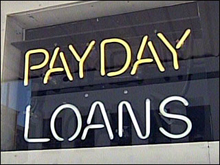 CashCall Inc., a California-based payday loan company known for allegedly aggressive business practices, was investigated and subsequently sued by the West Virginia Attorney General and has had to pay a $13 million fine after being accused of abusive debt collection in violation of the Fair Debt Collection Practices Act (FDCPA).
CashCall Inc., a California-based payday loan company known for allegedly aggressive business practices, was investigated and subsequently sued by the West Virginia Attorney General and has had to pay a $13 million fine after being accused of abusive debt collection in violation of the Fair Debt Collection Practices Act (FDCPA).
According to the CashCall FDCPA lawsuit, this payday loan company has allegedly harassed its consumers through excessive phone calls throughout the day and night, threatened involving local law enforcement, disclosing private financial information with friends and acquaintances of the borrowing consumers, and charging their customers 139 percent interest on the loans serviced.
In this FDCPA lawsuit involving a group of West Virginia residents, CashCall allegedly made 84,371 calls in total to 292 West Virginia borrowers. About 16 of the consumers claim to have received more than 1,000 calls from the loan company, 40 reportedly received between 500 to 1,000 calls, with the remaining consumers allegedly receiving 200 to 500 phone calls from CashCall.
While this decision was first issued in 2012, the final memorandum affirming all the rulings of the circuit court on the matter of abusive debt collection practices and additional fines tacked onto the 2012 CashCall Inc. ruling was not filed until May of this year.
According to the memorandum on the CashCall FDCPA lawsuit, “In total, the circuit court ordered CashCall to pay more than $13.8 million in penalties and restitution, and $446,180.00 in fees and costs.” According to several news sources and accounting websites, this decision may turn out to be a landmark case in the world of FDCPA lawsuits.
According to Margot Saunders of the National Consumer Law Center, the FDCPA has only been used to regulate the actions and aggressive business practices of third party debt collectors, leaving the original payday loan companies without any responsibility to their consumers. With the recent judgment against CashCall in this FDCPA lawsuit, it seems that creditors who build a business on the assumption that a consumer will not be able to pay it back, and further abuse their consumers through unfair debt collection, might be held accountable in the future.
The CashCall FDCPA Lawsuit is Patrick Morrisey v. Cash Call Inc., et al., Case No. 12-1274, in the State of West Virginia Supreme Court of Appeals.
What is the Fair Debt Collection Practices Act (FDCPA)?
The FDCPA was passed by Congress in 1978 with the intent to curb unfair debt collection practices. Debt collection is not an illegal practice, however, borrowers have rights and the FDCPA works to protect those rights and the borrowing consumers from debt collection abuse.
According to the FDCPA, unfair debt collections practices that infringe on the rights of the consumer include:
- Debt collection harassment
- Telephone harassment
- False statements and deceptive practices
- Collection of debts not owed by the consumer
- Collection of expired debts
- Improper reporting of the debtors’ loan to credit reporting agencies
- Refusing to cease communication even under request
- Improper communication between the lenders and other third parties
CashCall Inc. is not the only creditor or debt collection agency facing potential lawsuits and FDCPA class action lawsuits from U.S. consumers.
Join a Free Unfair Debt Collection Class Action Lawsuit Investigation
If a lender or debt collector engaged in unfair debt collection practices, you may have a legal claim and could be owed compensation for violations of the Fair Debt Collection Practices Act (FDCPA).
Get a Free Case Evaluation Now
ATTORNEY ADVERTISING
Top Class Actions is a Proud Member of the American Bar Association
LEGAL INFORMATION IS NOT LEGAL ADVICE
Top Class Actions Legal Statement
©2008 – 2025 Top Class Actions® LLC
Various Trademarks held by their respective owners
This website is not intended for viewing or usage by European Union citizens.















One thought on CashCall to Pay $13M in FDCPA Lawsuit
Where’s the money, this case against cashcall has been going on since 2008, longer than Vietnam War, they settled with New York in 6 months. What’s the holdup?